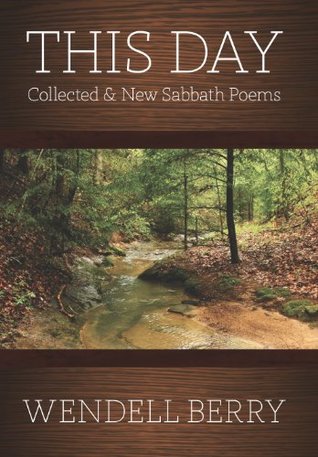More on this book
Community
Kindle Notes & Highlights
These poems were written in silence, in solitude, mainly out of doors. A reader will like them best, I think, who reads them in similar circumstances—at least in a quiet room. They would be most favorably heard if read aloud into a kind of quietness that is not afforded by any public place. I hope that some readers will read them as they were written: slowly, and with more patience than effort.
But I am a bad-weather churchgoer. When the weather is good, sometimes when it is only tolerable, I am drawn to the woods on the local hillsides or along the streams.
To be quiet, even wordless, in a good place is a better gift than poetry.
We are to rest on the sabbath also, I have supposed, in order to understand that the providence or the productivity of the living world, the most essential work, continues while we rest. This work is entirely independent of our work, and is far more complex and wonderful than any work we have ever done or will ever do. It is more complex and wonderful than we will ever understand.
The condition of the people is indistinguishable ultimately from the condition of the land. Work that destroys the land, diminishing its ability to support life, is a great evil for which sooner or later the punishment is homelessness, hunger, and thirst. For some, the context of this thinking has shifted from religion to science, but the understanding of the land as a conditional gift has not changed.
Nature of course includes damage as a part of her wholeness. Her creatures live only by the deaths of other creatures.
The fundamental conflict of our time is that between the creaturely life of Nature’s world and the increasingly mechanical life of modern humans.
To rest, we must accept Nature’s limits and our own. When we come to our limit, we must be still.
That one is sometimes able, among the disturbances of the present world, to wander into some good and beautiful whereabouts of the woods, grow quiet, and come to rest is a gift, a wonder, and a kind of grace.
We are the ones who are undomesticated, barbarous, unrestrained, disorderly, extravagant, and out of control. They are our natural teachers, and we have learned too little from them.
The growth of fifty thousand years undone In a few careless seasons,
Six days of work are spent To make a Sunday quiet That Sabbath may return. It comes in unconcern; We cannot earn or buy it.
The burden of absence grows, and I pay daily the grief I owe to love for women and men, days and trees I will not know again.
Why must the gate be narrow? Because you cannot pass beyond it burdened.
The seed is in the ground. Now may we rest in hope While darkness does its work.
A cow To milk’s a good excuse To bring you home from places You do not want to be.
A lot of people would Rather work hard to buy Their food already cooked Than get it free by work.
When my father was an old man, past eighty years, we sat together on the porch in silence in the dark. Finally he said, “Well, I have had a wonderful life,” adding after a long pause, “and I have had nothing to do with it!”
Hate has no world. The people of hate must try to possess the world of love, for it is the only world; it is Heaven and Earth. But as lonely, eager hate possesses it, it disappears; it never did exist, and hate must seek another world that love has made.
And the people eat together by The charity of God, who is kind Even to those who give no thanks.
Our Christmas tree is not electrified, is not covered with little lights calling attention to themselves (we have had enough of little lights calling attention to themselves). Our tree is a cedar cut here, one of the fragrances of our place, hung with painted cones and paper stars folded long ago to praise our tree, Christ come into the world.
I was wakened from my dream of the ruined world by the sound of rain falling slowly onto the dry earth of my place in time. On the parched garden, the cracked-open pastures, the dusty grape leaves, the brittled grass, the drooping foilage of the woods, fell still the quiet rain.
Eternity is not infinity. It is not a long time. It does not begin at the end of time. It does not run parallel to time. In its entirety it always was. In its entirety it will always be. It is entirely present always.
OLD MAN JAYBER CROW Many I loved as man and boy Are gone beyond all that I know, Fallen leaves under falling rain, Except Christ raise them up again. I know my blessings by their cost, Thus is the pride of man made low. To ease the sorrow of my thoughts, Though I’m too weary now and slow, I’d need to dance all night for joy.
The nation is a boat, as some have said, ourselves its passengers. How troubling now to ride it drifting down the flow from the old high vision of dignity, freedom, holy writ of habeas corpus, and the land’s abundance—down to waste, want, fear, tyranny, torture, caricature of vision in a characterless time, while the abyss whirls below.
With “labor-saving technology” replace workers at their work and hold them in contempt because they have no “jobs.”
After the long weeks when the heat curled the leaves and the air thirsted, comes a morning after rain, cool and bright.


